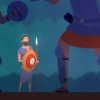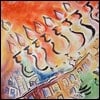It’s finals week at Michigan State University—when every available moment is usually spent studying—but senior Alex Mision and a group of Chabad on Campus students stopped what they were doing and got on a bus from East Lansing to Detroit on the first night of Chanukah to take part in a public menorah-lighting. Being there was a priority for the group of 30 that rode a bus an hour and a half each way to attend “Menorah in the D.” There, they joined a crowd of 3,000 community members, dignitaries and relatives of Israeli hostages.
Co-president of Chabad on Campus at MSU, Mision says she was inspired to see so many people gathered at downtown Detroit’s Campus Martius Park to watch the lighting of the 26-foot menorah with pride. “When I got there, I could feel the excitement and the energy in the crowd,” said Mision, who was honored as a lamplighter who would help light the giant menorah. “I was standing on the side of the stage with the torch, looking out into the crowd; it was a beautiful thing to see everybody together,” she told Chabad.org.
With antisemitism on the rise, especially on college campuses and in urban centers with large Jewish populations, all eyes in metropolitan Detroit’s Jewish community were on Chabad to to see how it would respond, explained Rabbi Yisrael Pinson, co-director, with his wife, Devorah Leah, of Chabad of Greater Downtown Detroit, which erects “Menorah in the D” every year.
This year marks 50 years since the Rebbe—Rabbi Menachem M. Schneerson, of righteous memory—launched his worldwide Chanukah campaign, bringing the “Festival of Lights” to wherever Jews are. Heeding the Rebbe’s call not to cower in the face of adversity, Detroit not only went ahead with public menorah-lightings but with support from the city’s mayor and community leaders increased their visibility and the numbers of those participating. “The Jewish people are committed to the city of Detroit, and Detroit is committed to the Jewish people,” said Pinson.
A number of elected officials sat onstage, including U.S. Rep Haley Stevens and Michigan Attorney General Dana Nessel, both of whom addressed the crowd. They were joined by local community leaders and the special guests from Israel.
“I want all of you to know that you must be proud of who you are, that you must continue to show up unafraid, unabashed, because America is a place for the Jewish people,” Stevens told the cheering crowd. “And in the United States Congress, I will continue to fight for the people of Israel, [and] I will continue to fight for Israel’s existence.”

Rabbi Kasriel Shemtov, vice president and executive director of Chabad-Lubavitch of Michigan, which erects this menorah every year, rallied those gathered with words of encouragement. “The past 61 days we have seen incredible strength, incredible resilience, incredible unity and incredible miracles,” he said. “Yes, while there are dark forces trying to intimidate, to isolate, even to eliminate Jewish people, Jewish people are responding with light all over the world, with prayers, with goodness, with mitzvahs, with faith,” he told the crowd.
Yair Moses and Ella Ben Ami, both of whose parents were kidnapped by Hamas on Oct. 7 a were in Detroit to take part in the menorah-lighting were honored with lighting the menorah and addressed the crowd. Though their mothers have been released, both of their fathers remain hostages in Gaza.
“There is no place for evil in this world,” Moses told the crowd. “We cannot turn our gaze the other way and allow darkness to settle in. We must listen to the stories of the flames of the menorah to strengthen our resolve to fight evil so light can freely shine again.”

Chanukah festivities in Detroit continue this week, and on Dec. 13, Chabad will light a basketball menorah at the Detroit Pistons Jewish Heritage night, with tickets available that include kosher food and autographs by G-League Jewish basketball sensation Ryan Turell.
Mision, who grew up in Metro Detroit, says she was proud to be part of the Detroit event and see the community standing strong. “Being at school these days can be very difficult,” she said. “So being able to come home and be around all these people I’ve grown up with, and that I know are doing such amazing things for the Jewish people, was very reassuring and also very healing during this difficult time.”














Start a Discussion